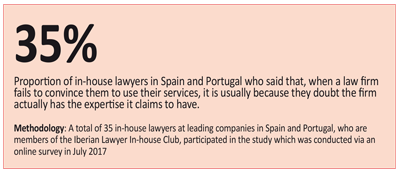The art of charm

 In a fiercely competitive legal market, law firms need to improve their client relationship skills in order to win more mandates – so what lessons can firms learn about winning client trust?
In a fiercely competitive legal market, law firms need to improve their client relationship skills in order to win more mandates – so what lessons can firms learn about winning client trust?
It’s more important than ever for law firms to improve their client relationship skills. While the economies of Spain and Portugal may be in a healthier state than they were in the midst of the crisis, managing partners warn that, even if investment in Iberia is increasing, this does not mean that there will be a significant growth in the amount of work for lawyers. Instead, in an increasingly competitive legal market, the key to success will be the ability to win mandates and build strong and lasting client relationships. The key question for lawyers now is this: what do clients want?
Iberian Lawyer has conducted a study involving general counsel at leading companies in Spain and Portugal to find out where law firms in both countries go wrong when it comes to client relationships, what have been their worst experiences when dealing with external lawyers, and also what have been their best. In other words, the objective was to find out what clients require from their external lawyers.
Perhaps unsurprisingly, one of the major concerns of client is fees. Nearly two-thirds of study participants (63 per cent) said they wanted law firms to have a more flexible approach to billing and also be more willing to negotiate on fees. The second most important requirement is that law firms make a proper effort to fully understand what their client’s business actually involves. Over half (54 per cent) of respondents said that law firms that want to win their business could improve their chances if they demonstrated a “more detailed understanding of our business”. Effective communication is another quality that is in demand from clients – almost a third (31 per cent) said they could do more to “explain complicated subjects in a more easily understandable way”.
Unfortunately, it seems that clients often do not get the service they expect from their external lawyers. Participants in the study shared some of their horror stories, which included what they consider to be uninterested, money-grabbing lawyers, whose unprofessional work has led to clients having to correct poorly drafted contracts themselves, or even being blackmailed into paying higher fees than were originally agreed.  One Spanish client related this tale of their experience using a supposedly “reputable” firm: “The firm assisted us in closing a real estate asset management agreement, the main problem was their lack of understanding of the deal. The second problem was they underestimated the skills and dedication required to do the job to an acceptable standard. So, instead of investing time creating an appropriate contract and identifying threats and potential ways to protect against them, they simply tried to get through the job in a very superficial way – they did not object to the messy contract proposed by the other party and showed very poor drafting skills, which meant the document was confusing and riddled with inaccuracies. All ‘red flags’ were raised by us, and the contract had to be completely re-designed and redrafted by us internally. Finally, they were not flexible on fees, despite a significant amount of time having been incurred amending previous mistakes.” We can safely assume the client in question will not be engaging that firm again.
One Spanish client related this tale of their experience using a supposedly “reputable” firm: “The firm assisted us in closing a real estate asset management agreement, the main problem was their lack of understanding of the deal. The second problem was they underestimated the skills and dedication required to do the job to an acceptable standard. So, instead of investing time creating an appropriate contract and identifying threats and potential ways to protect against them, they simply tried to get through the job in a very superficial way – they did not object to the messy contract proposed by the other party and showed very poor drafting skills, which meant the document was confusing and riddled with inaccuracies. All ‘red flags’ were raised by us, and the contract had to be completely re-designed and redrafted by us internally. Finally, they were not flexible on fees, despite a significant amount of time having been incurred amending previous mistakes.” We can safely assume the client in question will not be engaging that firm again.
Another experience recounted by an in-house lawyer in Spain concerns an external lawyer who, in an effort to convince senior management at the company he is advising that he is indispensable, repeatedly ignores the work done by the client’s in-house team: “My worst experience involves a partner of a law firm who does all he can to set aside the work done by the in-house team in order to make the management think that they desperately need to retain him because he is the one that has the most in-depth knowledge of the company’s business, and the company cannot rely on the in-house team’s advice – this has happened several times with the same person.” A story that clearly highlights the tensions that can exist between in-house legal departments and the external lawyers they use, and an example of what lawyers should not do if they want to improve client relationships.
Other cautionary tales highlighted by study participants included one law firm that made a “terrible impression” following a beauty parade. “We held a beauty parade involving three firms to select a law firm to defend us in litigation – before starting work on the matter, the firm we selected presented an invoice for the work they had done preparing their presentation,” said one respondent. Another in-house lawyer recalled an instance in which “before submitting an injunction, the law firm billed for a higher fee than had been agreed, despite the fees having already been agreed in advance – they forced us to negotiate under threat of leaving the case.”
Money seems to be a major source of disagreement and the effects on law firm-client relationships can be significant. One in-house lawyer in Spain remarked that their experiences with international firms had involved dealing with lawyers who were “billing obsessed and more concerned about their monthly invoices than the case, and who spent every single minute trying to generate more work for themselves”.
Meanwhile, another study participant recalled one occasion when they were forced to question exactly where their external lawyer’s loyalties lay. “There was one disinvestment where our lawyer ended up closer to the seller than to us as they hoped to win the seller as a client.” Other common complaints made by in-house lawyers included law firms that took little interest in their case, failed to meet deadlines, and were unresponsive and uncommunicative. One respondent summed up one of their experiences very succinctly: “The law firm never solved the problem that my company had.”
No need to worry
Obviously, these anecdotes give law firms a clear idea of what they should not do when dealing with clients, but what are the characteristics of a law firm that provides clients with an experience they will want to repeat?
It seems that, in order strengthen client relationships, law firms need to be proactive, quick, flexible on fees, and also honest. One client described their best experience using an external law firm like this: “There was perfect coordination of a really big team with highly talented lawyers of different levels of seniority and expertise, there was clear understanding of the targets and challenges, a well designed strategy, impressive speed and accuracy in drafting.”
Meanwhile, an in-house lawyer in Portugal said their best client experience gave them the sense that “the issue was being taken care of and that the legal team was really involved and were pro-active – I did not have to worry and could relax.”
Honesty is also a highly valued trait among clients. One respondent said their best experience was a situation in which the law firm, “after analysing our case, advised us not to proceed to court because it was so weak that we had almost no possibility of success”. Meanwhile, another client said their best experiences were situations in which the law firm “agreed a flat rate, so then we can discuss the issues without being concerned about the clock running and how many fee-earners are attending meetings or are involved in calls, for example”.
Generally speaking, law firms being willing to negotiate on fees seems to be a crucial client requirement. Around half (44 per cent) of the respondents to the survey said that if a law firm fails to convince them to use their services, it was usually because they were “not flexible or willing to negotiate on fees”.
The good news for law firms is that if you do upset a client, it is possible to redeem yourself if you acknowledge your mistake. One in-house lawyer complained of the time that in one case, the external lawyer changed three times: “We had to explain the situation, and facts, each time a new lawyer came because nobody in the firm properly explained the situation to the new lawyer – one of the lawyers then forgot to send information to the court, so we had to assume control of the situation.”
However, when the client alerted the firm to the problem, it took responsibility and offered a remedy. The client added: “We talked with the firm, every complaint was accepted and they decided not to charge any more fees until the end of the trial.” Our survey showed that the majority of respondents (63 per cent) said the law firms they use do not ask for feedback on their services – however, it’s clear that if dissatisfied clients do volunteer to voice their concerns, some law firms will take steps to rectify any problems.












